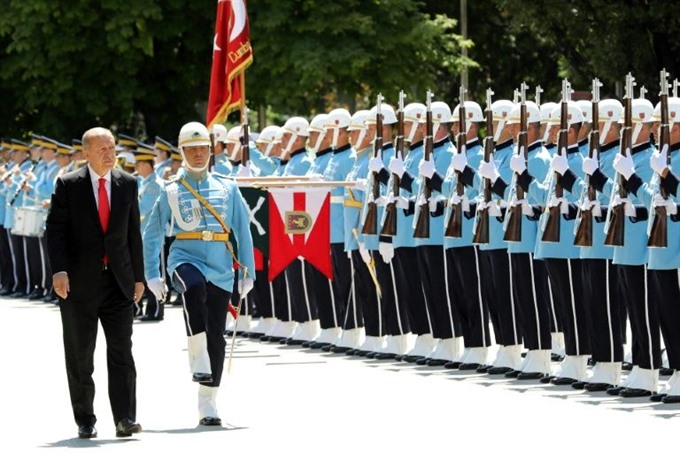 World
World

President Recep Tayyip Erdogan on Monday took on greater powers than any Turkish leader for decades as he was sworn in for a second presidential term, naming his son-in-law to the key post of finance minister in a revamped cabinet.
 |
| The president now sits at the top of a vertical power structure marked by a slimmed-down government with 16 ministries instead of 26 and multiple bodies reporting to him. — AFP/VNA Photo |
ANKARA — President Recep Tayyip Erdogan on Monday took on greater powers than any Turkish leader for decades as he was sworn in for a second presidential term, naming his son-in-law to the key post of finance minister in a revamped cabinet.
Erdogan, who has already transformed Turkey in 15 years of rule, took his oath of office in parliament under the new presidential system denounced by opponents as a one-man regime.
Describing the monumental change as a "new beginning", he vowed at a later ceremony at his vast Ankara presidential palace to be the president of all 81 million Turks.
"We have come not to be master but to be servant of our people," he added.
He then unveiled the first cabinet under the new system, appointing his son-in-law Berat Albayrak, 40, to the crucial post of finance minister, in a move that appeared to rattle markets.
Army chief of staff General Hulusi Akar joined the government as defence minister but Mevlut Cavusoglu kept the post of foreign minister.
Fuat Oktay, a former head of Turkey’s emergencies agency, has been named as the sole vice president, a newly-created post.
’One-man regime’
The new system, which dispenses with the office of prime minister, was agreed in a bitterly-fought 2017 referendum narrowly won by the "Yes" camp. The issue continues to polarise public opinion in Turkey.
"A partisan one-man regime starts officially today," said the opposition Cumhuriyet newspaper.
But the pro-government daily Yeni Safak hailed it as an "historic day", saying: "One page is closing in Turkish history and a new page is opening."
The president now sits at the top of a vertical power structure marked by a slimmed-down government with 16 ministries instead of 26 and multiple bodies reporting to him.
In one of the most significant changes, the EU affairs ministry, set up in 2011 to oversee Turkey’s faltering bid to join the bloc, is being subsumed into the foreign ministry.
Prime Minister Binali Yildirim now goes down in history as the 27th and final holder of the post in Turkey. He is expected to become speaker of the new parliament.
’Leader of multi-polar world’
The transition ceremony was overshadowed by a deadly train derailment in northwest Turkey on Sunday that killed 24 people and injured hundreds. Erdogan said that folk dancing and a laser show had been cancelled as a result.
Those attending included Ankara’s top allies from Africa, the Middle East and the former Soviet Union but relatively few European figures.
Russian Prime Minister Dmitry Medvedev was present, in a new sign of the warm ties between Ankara and Moscow, as was Venezuelan President Nicolas Maduro, regarded with disdain by Washington but an ally of Erdogan.
In a tweet, Maduro hailed Erdogan as a "friend of Venezuela and leader of the new multi-polar world."
But Erdogan faces immediate challenges posed by Ankara’s faltering bid to join the EU and tensions between the United States and its NATO ally.
Erdogan will this week immediately turn to foreign policy, visiting northern Cyprus and Azerbaijan, followed by more challenging encounters at a NATO summit in Brussels where he will meet US President Donald Trump and other leaders.
Lira pressured
The markets were keeping a close eye on the finance ministry, keen to see a steady hand at the helm in a fast-growing economy dogged by double-digit inflation and a widening current account deficit.
The appointment of Albayrak, the husband of Erdogan’s elder daughter Esra and formerly energy minister, came as a surprise, with no place for Mehmet Simsek, the former deputy prime minister for the economy trusted by markets.
The Turkish lira lost 3.5 percent in value on the news to trade at 4.73 lira to the dollar.
Ruhsar Pekcan, one of just two women in the cabinet, was named as trade minister.
Hardline Interior Minister Suleyman Soylu keeps his job, while Akar’s appointment as defence minister was also a surprise and it remains unclear who will replace him as army chief of staff.
The AKP failed to win a majority in legislative elections and will need support from its allies in the right-wing Nationalist Movement Party (MHP) which could push it into more hardline policies.
Erdogan has also pledged to end the state of emergency that has been in place since the failed July 2016 coup and which has seen the biggest purge in the history of modern Turkey.
One day ahead of the inauguration, 18,632 public sector employees were ordered dismissed, including thousands of soldiers and police officers in a new crackdown. — AFP

.jpg)


